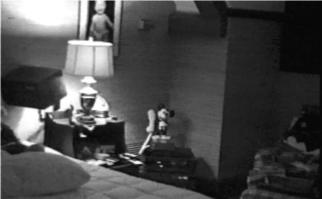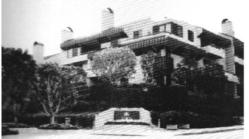Jacko, His Rise and Fall: The Social and Sexual History of Michael Jackson (61 page)
Read Jacko, His Rise and Fall: The Social and Sexual History of Michael Jackson Online
Authors: Darwin Porter

It's been my fate to compensate
for the childhood I've never
known.

Trolls and Peter Pans
found in secret room
For truly private getaways, Michael
rented a so-called bachelor pad in the
summer of 1989, calling it "The
Hideout." Actually it was a condo on
the 14th floor of The Westford, a luxury housing unit at 10750 Wilshire
Boulevard. When the police, in years to come, raided the condo, it was discovered that it didn't have a bed, only a sleeping bag and a large-screen TV
Many of Michael's special friends were taken surreptitiously to The
Hideout. Often parents, usually a mother, delivered her son to Neverland.
Michael sometimes, later in the dark of the night, took the boy to the condo.
When it was later revealed that Michael had a "secret address," one story
was headlined: AT LONG LAST MICHAEL JACKSON DISCOVERS
GIRLS.
Perhaps not believing what he wrote, one journalist claimed that
Michael-"rather belatedly"-was discovering girls and now had a rendezvous condo for his private assignations.
"This was all a big joke, and the reporters writing such shit probably didn't believe it themselves," said Robert Estelle. "The story about the fuck pad
turned out to be true. Only the reporters at the time got the genders confused."
Life was not all fun and games with young boys at Neverland. Michael
worked on a 93-minute music video cassette Moonwalker, which included a
montage of live footage of himself in concert. With Michael, of course, cast
as the main character, Moonwalker also contained a series of fantasy pieces.
Even fat boy Frank DiLeo, Michael's manager, appeared in the video, along
with familiar faces such as Mick Jagger or Sean Lennon playing themselves.
One of the dancers was Michael's nephew, Jermaine Jackson Jr.
Elizabeth Taylor as "Herself'
appeared uncredited in archive
footage. Michael originally wanted to
release Moonwalker in theaters but
budget restraints forced him to take it
straight to video release.

Peter Pan pillows for the kids
The most disturbing part of
Moonwalker wasn't associated with its
view of the shrine to Ms. Taylor, but Michael dancing with what supposedly was the Elephant Man's skeleton.

Darkest corners of secret room
Upon its release, Moonwalker was a
hit, even outselling the former number
one best-selling music video of all
time, "The Making of Michael
Jackson's `Thriller."' For twenty-two
weeks Moonwalker held its position as
Billboard's Number One video cassette. After that, it was knocked down
to number two by the release of Michael Jackson: The Legend Continues.
The video racked up sales of $30 million. But Michael had invested $27
million, making his cut less than $3 million, even less when final expenses
were deducted.
"He blamed everybody," an aide said confidentially. "He even threatened
to fire DiLeo. Jackson shouted, screamed, and raged, placing responsibility on
everybody but the one person responsible for the low return-Michael
Jackson himself. When he wasn't screaming about Moonwalker, he was
screaming about the final tallies coming in on the Bad album, even though it
was the second best-selling album of all time. Jackson wanted one hundred
million copies sold, not the fifth of that he actually got. We felt he was so unrealistic in the big sales he demanded that he'd become delusional."
After five years of being "inseparable," Michael, for reasons of his own,
fired his Uncle Tookie, Frank DiLeo. From all reports, DiLeo had been a successful manager for Michael, the most temperamental star in Hollywood. His
manager had stood by Michael through many a disaster.
He had his attorney, John Branca, do the dirty deed. Getting DiLeo on the
phone, Branca told him, "Michael called this morning. He's decided he doesn't want to work with you any more."
Putting up a brave front, DiLeo said, "If the kid has mandated that, it's
okay with me." That very day he set about trying to find another job.
Ironically, he succeeded where Michael hadn't-in the movies. He was cast in
Martin Scorsese's Goodfellas, appearing with Robert De Niro, and in both the
Waynes World movies with Mike Myers and
Dana Carvey.

The Westford
There was much speculation about why
Michael fired DiLeo, but only the impulsive
star himself knows for sure. At times Michael
blamed DiLeo for the tabloid "Wacko Jacko"
image. He also blamed him that the album,
Bad, didn't top Thriller in sales. He also felt that DiLeo was taking far too much credit for Michael's own achievements.
Because Michael would not face the press, and DiLeo had to go on for him in
front of TV cameras and microphones, he was becoming increasingly well
known. Michael also claimed that DiLeo was getting "too bossy and possessive."
One member of the Bad troupe claimed that "Michael Jackson was seriously pissed about everything. DiLeo, a real sweet, good guy, who lived,
breathed, and slept the advancement of the career of Michael Jackson, became
the fall guy."
To friends, DiLeo expressed his hurt feelings, "It was cowardly not to call
me personally and tell me I was out the door. I treated him like my own son."
Michael didn't want to meet DiLeo's demand for $5 million in severance
pay. But when the man Michael once called "my shield of armor, my other
half"threatened to go public with "secrets to make the tabloids blush," DiLeo
got his $5 million check.
On Diane Sawyer's Good Morning America TV show in 2004, DiLeo
gave a somewhat enigmatic answer to a question about why Michael fired
him. "I think it was, he fired me because it was politically asked of him. There
was an outside record executive with a big-time lawyer and one executive at
Sony that would like to see Michael's power cut in half. And getting rid of me
was half the power."
DiLeo's final word on Michael: "He's part Howard Hughes, part E.T.
Michael Jackson begs description." Like Howard Hughes, who employed a
so-called press agent, Johnny Meyer (actually his pimp) to handle many of his
least pleasant tasks, the reclusive Michael hid behind DiLeo for a good part of
the 80s.
Kenny Rogers, the country music star, was in the unique position of
knowing both the King of Pop and the King of Rock and Roll. "Michael is the
Elvis of his generation," Kenny said. "Like Elvis, Michael too is locking himself away from the real world. That's an extremely unhealthy way to live. I
know what it's like to be mobbed by fans every time you go out. It can be terrifying. But, he's seen out so rarely that when he's spotted, it's a major
event-and he gets mobbed. Even so, he's got to learn to get out more."
At Neverland, Michael ventured out very rarely and always in disguise. In
spite of invitations from Katherine, he avoided a return visit to Hayvenhurst.
"There were weird things going on at Neverland, but unlike life at Encino,
no violence," said a former maid who'd worked at both estates. "The difference between Neverland and Hayvenhurst is that family fights often occurred
at Hayvenhurst. Except for Michael, the acorns didn't fall far from the tree."
She was referring to the sons of Papa Joe. In many ways, at least in their
domestic lives, they emulated their father's own behavior and unhappy mar riage.
A good example of this involved Michael's brother Jackie: Even though
Enid Spann's marriage to Michael's brother, Jackie, had ended in August of
1987, Jackie was later arrested on a charge of harassing his former wife.
Arriving at her home, where she was entertaining, Jackie kicked in her French
doors, sending shards of glass flying. She called the police, who later charged
Jackie with violating a restraining order issued by a judge.
Jermaine's marital problems seemed even more dramatic than those of
Jackie. After a tumultuous marriage to Hazel Gordy, during which Jermaine
frequently cheated on his wife, the marriage had wound down by 1988, and
would eventually end in divorce. But before it did, Jermaine would start
another family with Margaret Maldonado, eventually fathering two children
with her-Jeremy and Jourdynn. At one point both Margaret and Hazel were
pregnant with Jermaine's babies. As Enid Spann once claimed, Jermaine
showed up with his three-month-old son at Marlon Jackson's birthday party in
December of 1986, with a pregnant Hazel at his side. In August of 1988,
Jermaine, while visiting his ex-wife, Hazel, attempted to rape her. She
screamed as he forcefully held her down, but managed to escape by biting his
arm.
Randy's romantic life would grow even more complicated than those of
his brothers. After reportedly having as many affairs on the side as his older
brother, Jermaine, Randy married Eliza Shaffe in May of 1989, an ill-fated
union that would produce one child and end in divorce in 1991. The divorce
was acrimonious, and Eliza later filed a criminal complaint against Randy,
charging that he beat her during her pregnancy. He pleaded no contest to the
wife-beating charge and in November of 1991, he was sentenced to a twoyear period of probation. When he violated that probation, a judge sentenced
him to one month in jail. Katherine appeared in court to plead her son's case.
She was successful in getting the judge to change his decision. He agreed to
commit Randy for 30 days to the Pine Grove Mental
Hospital where he underwent domestic violence
counseling.